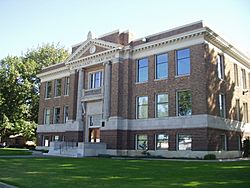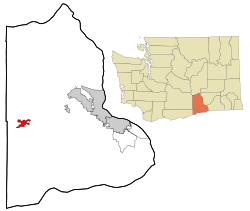Prosser, Washington facts for kids
Quick facts for kids
Prosser
|
|
|---|---|

Benton County court house in Prosser
|
|

Location of Prosser, Washington
|
|
| Country | United States |
| State | Washington |
| County | Benton |
| Incorporated | 1899 |
| Government | |
| • Type | Mayor–council |
| Area | |
| • Total | 4.79 sq mi (12.39 km2) |
| • Land | 4.66 sq mi (12.06 km2) |
| • Water | 0.13 sq mi (0.33 km2) |
| Elevation | 666 ft (203 m) |
| Population
(2020)
|
|
| • Total | 6,062 |
| • Estimate
(2022)
|
6,242 |
| • Density | 1,369.98/sq mi (528.96/km2) |
| Time zone | UTC-8 (Pacific (PST)) |
| • Summer (DST) | UTC-7 (PDT) |
| ZIP code |
99350
|
| Area code | 509 |
| FIPS code | 53-56450 |
| GNIS feature ID | 1512582 |
Prosser (/ˈprɑːsər/) is a city in Benton County, Washington, United States. It is the main city for the county government, known as the county seat. Prosser is located along the Yakima River. In 2020, about 6,062 people lived there.
Contents
Discovering Prosser's Past
Prosser was first home to Native American tribes. They lived and fished along the river for a very long time. They called this area "Táptat." This name means "long hair in front, short hair on the sides." It described a special type of headdress they wore.
How Prosser Was Founded
In 1879, a man named Colonel William Farrand Prosser explored this area. He officially claimed land here in 1882. Two years later, the Northern Pacific Railroad built train tracks through the area. Colonel Prosser then planned out the town in 1885. He was elected as the auditor for Yakima County in 1886. He moved away to North Yakima for his new job and never came back to the town he started.
Early Growth and Development
In 1887, Lewis Hinzerling built a flour mill near Prosser falls. This helped more people decide to settle in the area. The first irrigation canal was finished in 1893. This canal brought water to farms, which was very important for growing crops in a dry area. Prosser officially became a city in 1899. At that time, only 229 people lived there.
Becoming the County Seat
In 1905, Benton County was created. It was formed from parts of Yakima and Klickitat Counties. The new town of Prosser was chosen to be the county seat. This meant it would be the center for the county's government.
In 1907, Prosser got a power plant, bringing electricity to homes and businesses. A new high school was built in 1908. A year later, a telephone system was set up. In 1910, the city received money from Andrew Carnegie to build a public library.
The County Seat Debate
On November 5, 1912, people in Benton County voted on a special issue called a referendum. They wanted to decide if the county seat should move from Prosser. The choices were Kennewick or Benton City. There was a lot of competition and strong opinions between the three towns. Kennewick received the most votes. However, it did not get the 60 percent of votes required by law. So, Prosser remained the county seat.
Agricultural Research and Modern Times
In 1919, Washington State College (now WSU) opened the Irrigation Experiment Station in Prosser. This station helps farmers, orchard owners, and ranchers in the dry central part of the state. Scientists from WSU, the Washington State Department of Agriculture, and the United States Department of Agriculture work together here. The station is still active today, offering many farming education programs.
Prosser once had three newspapers. In the 1920s, they combined into one, the Prosser Record-Bulletin. A permanent courthouse was built in 1926. The Benton County Historical Museum opened in 1968.
More recently, Prosser's location by the Yakima River and its easy highway access have helped its wine business grow. This has also led to more tourism. Many Prosser wineries are part of the Yakima Valley AVA, which is a special wine-growing area.
Understanding Prosser's Location
Prosser is located near the eastern end of the Yakima Valley. It is about 203 meters (665 feet) above sea level. The Yakima River flows right through the city.
According to the United States Census Bureau, Prosser covers about 12.39 square kilometers (4.79 square miles). Most of this area is land, with a small part being water. The old community of Kinneyville is now a part of Prosser. The city's ZIP code is 99350.
Prosser's Climate and Weather
Prosser has a semi-arid climate. This means it is generally dry, but not a desert. It gets some rain, but not a lot.
| Climate data for Prosser, Washington (1991–2020 normals, extremes 1925–present) | |||||||||||||
|---|---|---|---|---|---|---|---|---|---|---|---|---|---|
| Month | Jan | Feb | Mar | Apr | May | Jun | Jul | Aug | Sep | Oct | Nov | Dec | Year |
| Record high °F (°C) | 69 (21) |
69 (21) |
81 (27) |
91 (33) |
100 (38) |
114 (46) |
111 (44) |
106 (41) |
101 (38) |
90 (32) |
76 (24) |
70 (21) |
114 (46) |
| Mean daily maximum °F (°C) | 40.1 (4.5) |
46.7 (8.2) |
55.9 (13.3) |
64.6 (18.1) |
74.1 (23.4) |
80.9 (27.2) |
90.4 (32.4) |
89.2 (31.8) |
79.7 (26.5) |
64.7 (18.2) |
49.3 (9.6) |
39.5 (4.2) |
64.6 (18.1) |
| Daily mean °F (°C) | 33.5 (0.8) |
37.6 (3.1) |
45.4 (7.4) |
52.2 (11.2) |
61.0 (16.1) |
67.2 (19.6) |
75.0 (23.9) |
73.4 (23.0) |
64.9 (18.3) |
52.8 (11.6) |
40.5 (4.7) |
32.9 (0.5) |
53.0 (11.7) |
| Mean daily minimum °F (°C) | 26.8 (−2.9) |
28.6 (−1.9) |
34.9 (1.6) |
39.9 (4.4) |
47.9 (8.8) |
53.6 (12.0) |
59.5 (15.3) |
57.7 (14.3) |
50.1 (10.1) |
40.8 (4.9) |
31.7 (−0.2) |
26.3 (−3.2) |
41.5 (5.3) |
| Record low °F (°C) | −20 (−29) |
−20 (−29) |
6 (−14) |
14 (−10) |
26 (−3) |
30 (−1) |
31 (−1) |
36 (2) |
21 (−6) |
11 (−12) |
−7 (−22) |
−11 (−24) |
−20 (−29) |
| Average precipitation inches (mm) | 1.24 (31) |
0.90 (23) |
0.69 (18) |
0.74 (19) |
0.88 (22) |
0.68 (17) |
0.21 (5.3) |
0.16 (4.1) |
0.27 (6.9) |
0.77 (20) |
0.86 (22) |
1.33 (34) |
8.73 (222) |
| Average precipitation days (≥ 0.01 in) | 8.3 | 5.9 | 5.9 | 5.2 | 5.8 | 3.7 | 1.7 | 1.5 | 2.7 | 5.7 | 7.1 | 8.3 | 61.8 |
| Source: NOAA | |||||||||||||
Prosser's Population and People
The population of Prosser has grown steadily over the years. Here's a look at how many people have lived in the city:
| Historical population | |||
|---|---|---|---|
| Census | Pop. | %± | |
| 1900 | 229 | — | |
| 1910 | 1,298 | 466.8% | |
| 1920 | 1,697 | 30.7% | |
| 1930 | 1,569 | −7.5% | |
| 1940 | 1,719 | 9.6% | |
| 1950 | 2,636 | 53.3% | |
| 1960 | 2,763 | 4.8% | |
| 1970 | 2,954 | 6.9% | |
| 1980 | 3,896 | 31.9% | |
| 1990 | 4,476 | 14.9% | |
| 2000 | 4,838 | 8.1% | |
| 2010 | 5,714 | 18.1% | |
| 2020 | 6,062 | 6.1% | |
| 2022 (est.) | 6,242 | 9.2% | |
| U.S. Decennial Census 2020 Census |
|||
What the 2020 Census Shows
In 2020, the census counted 6,062 people living in Prosser. There were 2,272 households in the city.
A Look at the 2010 Census
The 2010 census showed 5,714 people living in Prosser. There were 2,023 households and 1,396 families. The population density was about 493 people per square kilometer (1,272 people per square mile).
Most residents (76.1%) were White. About 37.2% of the population identified as Hispanic or Latino.
About 39.8% of households had children under 18. Nearly half (49.3%) were married couples living together. The average household had 2.80 people. The average family had 3.42 people.
The median age in Prosser was 32.8 years. This means half the people were younger than 32.8 and half were older. About 30.8% of residents were under 18 years old. About 13.5% were 65 years or older. The city had slightly more females (52.3%) than males (47.7%).
Prosser's Economy and Jobs
Prosser's economy is mainly based on agriculture. This includes fruit orchards and places where fruit is packed. Prosser is also a big part of the Yakima Valley AVA, which is a major area for growing grapes and making wine. Today, there are nearly 30 wineries in and around Prosser.
Learning in Prosser: Schools
Public education in Prosser is managed by the Prosser School District. This district runs six schools for students from kindergarten through 12th grade.
| Prosser High School | Grades 9–12 | 868 students |
| Prosser Opportunity Academy | Grades 9–12 | 25 students |
| Housel Middle School | Grades 6–8 | 571 students |
| Keene-Riverview Elementary | Grades K-2 | 394 students |
| Prosser Heights Elementary | Grades 3–5 | 359 students |
| Whitstran Elementary | Grades K-5 | 226 students |
| Total six schools | Grades K-12 | Total 2,443 Student Enrolled |
News and Radio in Prosser
At the start of the 1900s, Prosser had four different newspapers. Over time, these newspapers combined. On July 1, 1920, two main papers, the Republican Bulletin and the Independent Record, merged. They became the Prosser Record-Bulletin, which is still published today.
Prosser has also had an FM radio station since 1963. This station is called KZXR-FM (101.7 FM). It plays regional Mexican music. The station is owned by Bustos Media.
Famous People from Prosser
- Mary L. Boas — A mathematician and physics teacher who wrote books.
- George Boomer — A newspaper editor and politician.
- Walter Clore — Known as the "Father of Washington wine" for his work with grapes.
- Lorena González — A city council member in Seattle.
- Harold McCluskey — Nicknamed "The Atomic Man."
- Kellen Moore — A football coach for the Philadelphia Eagles. He used to be an NFL quarterback for the Dallas Cowboys and Detroit Lions. He also played college football for Boise State University and high school football in Prosser.
- Kelly Blair Labounty — An Olympian in 1996. She was the first person to beat famous athlete Jackie Joyner-Kersee in eight years.
- Colonel William Farrand Prosser — The person who founded the city of Prosser. He was also a U.S. Army Colonel during the Civil War.
- The Rt. Rev. Brian Norman Prior — The ninth Bishop of the Episcopal Church in Minnesota.
See also
 In Spanish: Prosser (Washington) para niños
In Spanish: Prosser (Washington) para niños
 | James Van Der Zee |
 | Alma Thomas |
 | Ellis Wilson |
 | Margaret Taylor-Burroughs |

